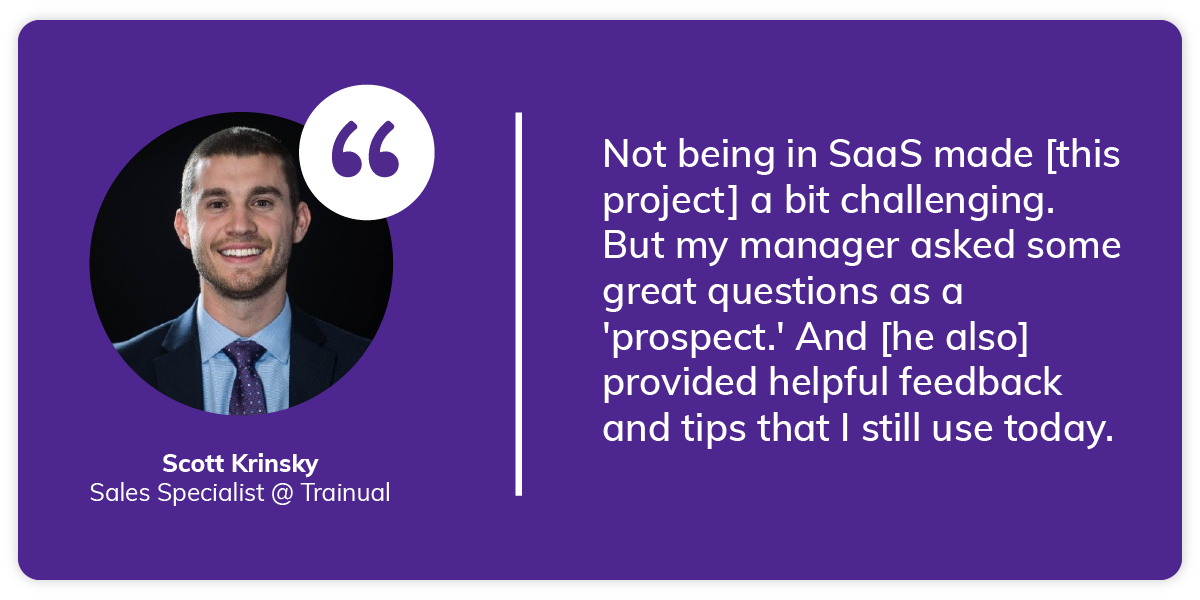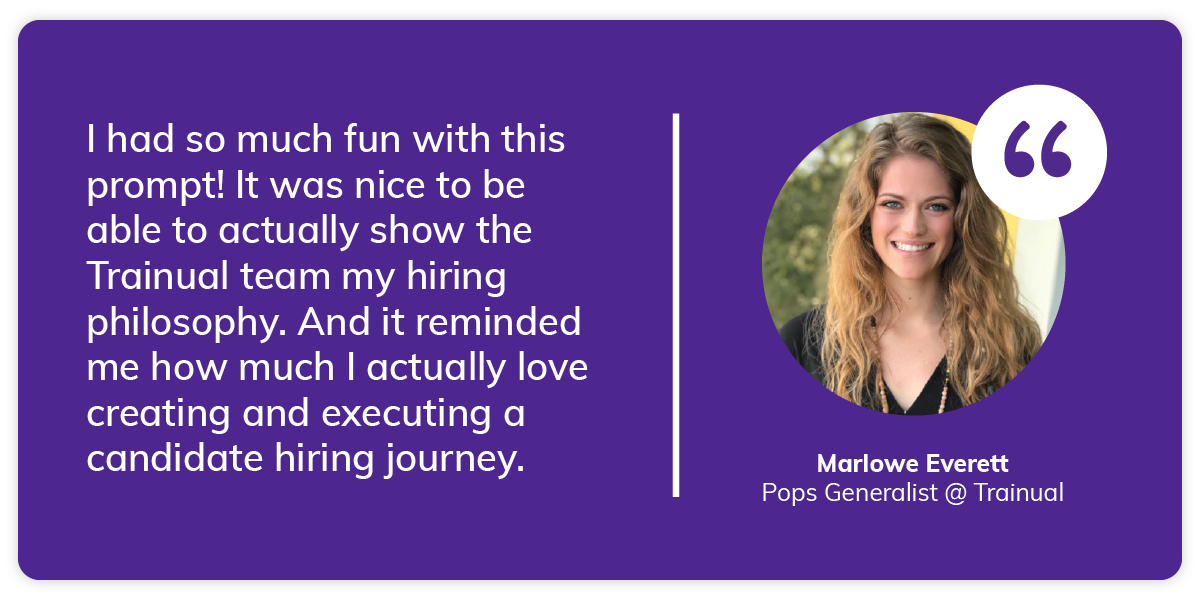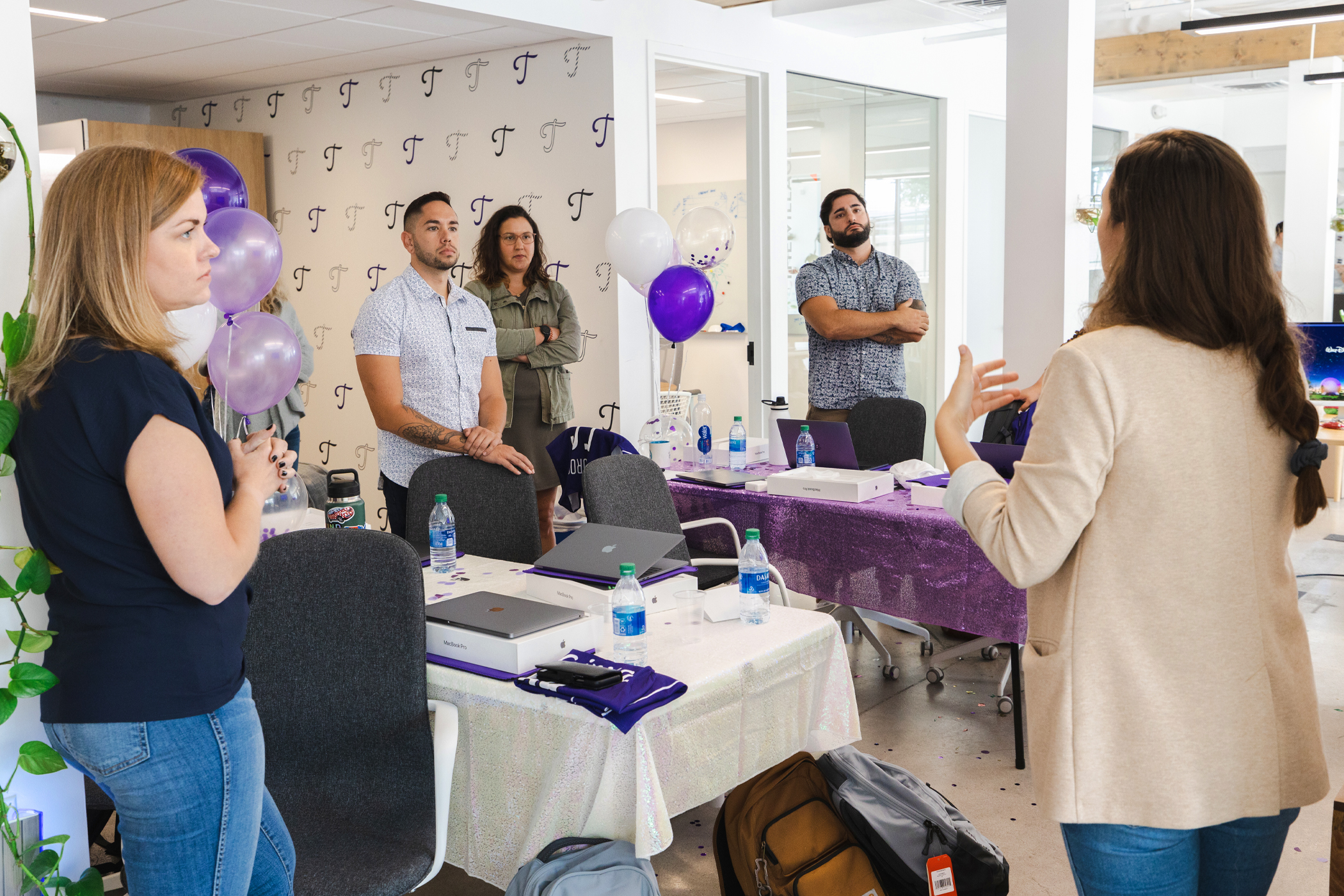
Articles
How To Make Sure Candidates Know Their Stuff
March 17, 2021

Most people don't like interviewing - no matter how excited they are for the role. It's super nerve-wracking. And it doesn't always show why they're one of the best candidates for the role.
So, rather than just seeing if someone can "talk the talk," why not have them "walk the walk?" Using a hands-on project, of course! That way, you can see their skills in action and test drive them in their prospective roles.
All while candidates get the opportunity to see if your company is right for them. (After all, the interview process is as much them interviewing you as it is you interviewing them.)
Here's an inside look at how exactly Trainual does this:
👉 Want to join the Trainual squad? Well, you're in luck - we're hiring! See all open positions.
Everyone does a project
Yep - regardless of role or title, everyone does a project. No exceptions.
That's because the same role looks different from company to company. So, sometimes a job sounds great on paper. It might even be the same title they have now.
But once the candidate steps into it, it doesn't live up to their expectations. Often, leaving you offboarding a candidate right after you hire them. So, a project gives them an accurate taste of what they'd be doing in the role. Before they go through onboarding.
Plus, a project helps you make sure you've found the absolute best person for the job. AKA someone who will help take your company to the next level.
So, have your existing team pinpoint a problem that they currently face. One that the role you're interviewing for will be responsible for solving. Then, create a prompt that allows the candidate to take their swing at it.
For example, we knew we wanted to add more stories into our content strategy. So, when we were ready to hire our first copywriter, we asked them to write the story they told us about how Trainual saved their internship.
Just make sure the project isn't mission impossible or a huge time suck. That way, you're respecting your candidate's time.
🔥 Tip: Have everyone going out for the same role complete the same project. That way, it's easier to gauge who the best fit for the role is.
But why a project?
The project phase helps evaluate 2 things: skill level and passion for the job.
For one, there's no better way for someone to prove that a candidate is right for the job than to have them actually do it!
Undoubtedly, candidates will tell you how amazing they would be for the role (and they probably are). But what's the harm in having them prove their stuff?
After all, if they're hired, they'll be doing similar projects all the time. So, you want to make sure they can actually complete them to your company standards.
And two, you want to make sure they actually like doing the work. How much effort a candidate puts into their project directly reflects how passionate they are about the role. And you'll be able to see it (and they'll be able to feel it) by the time they hit 'submit.'
That's because the candidate should be so gung-ho about the job that they give you 110%. And in the process, they prove by a landslide that they're the best choice for the job!
But there is also a chance that a candidate might find out they don't love the work. And their final project is less than impressive. And that's okay! Better to find out sooner than later.
When do these projects happen?
We typically ask candidates to go through 3 to 5 interviews. One with our People Ops team, one with each of our hiring managers, and one with the team they'd be joining.
And before the team interview, we ask them to complete a project. That way, we're only sending projects to people we are heavily considering extending an offer to. (We get it - it's a really big ask.) And we're not wasting our team's time on a candidate that won't work out.
At this point, have your hiring manager send over the project in an email. Give the candidate the full rundown of what's expected and how long they have to get it done (typically, 5 business days is best).
Then, give them the option to hop on a call for more information or email over questions at any time. That way, you can align expectations if need be.
🔥 Tip: Don't forget to have whoever is assigning out the project remind the candidate that this should be fun and a learning opportunity. So, they shouldn't be afraid to think outside the box!
When you get the project back, ask the candidate to come in and present it. You don't necessarily need everyone in the room for the presentation (again, nerve-wracking). But everyone on your interview squad should evaluate it.
Then, regardless of whether you're going to move forward with the candidate, give them actionable feedback on their project. This way, even a rejection doesn't feel like a dead end. At Trainual, we have either a Pops Generalist or the hiring manager deliver it - depending on the role and the circumstances.
After that, it's a quick team interview to check that the candidate has chemistry with the team and a reference check. Then, it's time to extend an offer.
What these projects look like
In case you're stuck (or just applied to Trainual and want to know what to expect), here's a look at the projects some of our current team members had to do:
1. Sales Specialist
At its core, sales is all about research and delivery. Meaning, the best salespeople research what their customers need. Then, they deliver it.
So, when we started our search for a Sales Specialist role, we couldn't resist asking them to do a mock demo.
Each candidate got 20-minutes to demo Trainual to our Head of CX. And when their time was up, Jeff got a few minutes to ask any questions that the demo didn't address.
This way, candidates could show us how quickly they could learn our product and their ability to research the small business market. Then, they got an opportunity to literally sell us on their consultative selling skills.
But it also let our candidates gauge how passionate they were about Trainual. Because as a Sales Specialist, they'd be talking about it pretty much all the time.

2. Pops Generalist
Meanwhile, our Pops Generalists own the interview process. And they're responsible for bringing amazing people onto our team!
So when we realized we needed to bring on another generalist (AKA me), 2 words came to mind: mock interview. It was the perfect way to ensure the candidate would provide an amazing candidate experience - and assess their interviewing skills.
Our Head of Pops created a fictitious leadership role. She created a job scorecard, defining what the role would be responsible for. Then, asked a fellow business leader to come in and pretend to interview for the role.
It was up to the candidates to create the interview flow, questions, and evaluation criteria. Then, they actually interviewed the business leader over Zoom and recorded it for our team to watch back after.

3. Senior Paid Acquisition Manager
As the person who would own all our paid media, hiring a Senior Paid Acquisition Manager was not a role that we could take lightly! So, we needed to make sure the project reflected the stakes of the role.
Each candidate set out to build a social media advertising campaign. One that would drive quality trial signups. And we provided them with our marketing assets and an imaginary budget. Then, let them run with whatever crazy ideas they could come up with.
A week later, we asked the candidates to come in and present a proposal for their campaign. Complete with a projection for how many trials the campaign would drive and the cost per trial.
This allowed the candidate to break down the logic for how they built the campaign - while showcasing their creativity and analytical understanding. AKA the skills that were an absolute must for the role.

For all these roles, we're specifically looking to see if the candidates understand the role. As well as gauge how they would perform in that role - including handling feedback.
But the candidates that stand out are always the ones who have fun with the prompt. AKA the ones that love what you do and love the work they'd be doing. After all, those are the people you want on your team!
Similar Blog Posts





.png)





